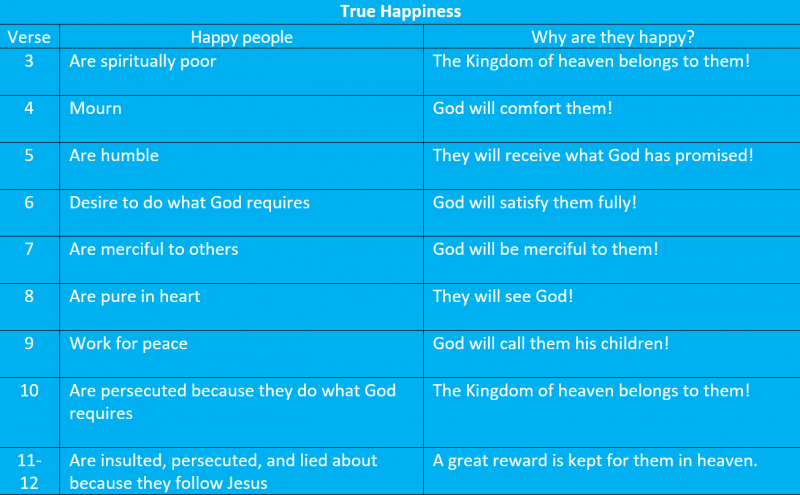Happiness According to the New Testament Photo by Loren Joseph at Unsplash
The Greek word μακάριος (makarios) is the New Testament equivalent of the Hebrew ʾǎš·rê. It is found 50 times in the NT and is variously translated as blessed, happy, and fortunate.
Makarios follows the similar theme pattern of the Old Testament Hebrew term ʾǎš·rê: Happy is the man: who keeps the law, who trusts the Lord, and whose sins are forgiven.
1. Happy is the man who keeps the law
– Luke 11:27-28 (GNT) – “… a woman spoke up from the crowd and said to him, ‘How happy is the woman who bore you and nursed you!’ But Jesus answered, ‘Rather, how happy are those who hear the word of God and obey it!’”
– John 13:12-17 (KJV) – “So after he had washed their feet, and had taken his garments, and was set down again, he said … If ye know these things, happy are ye if ye do them.’”
– James 1:25 (YLT) – “and he who did look into the perfect law … not a forgetful hearer becoming, but a doer of work — this one shall be happy in his doing.”
– Rev. 1:3 (GNT) – “Happy is the one who reads this book, and happy are those who listen to the words of this prophetic message and obey what is written in this book!”
2. Happy is the man who trusts in the Lord
Often happiness is found when trusting the Lord, living beyond our circumstances. This is certainly the case with the young Jewish virgin, Mary, who becomes the mother of the Messiah. She is in a covenantal betrothal when the angel declares she will conceive, without intercourse, by the Holy Spirit. She responds, “I am the Lord‘s servant; may it happen to me as you have said.” Mary trusted in the Lord in difficult circumstance and says people will call her happy: “For he has remembered me, his lowly servant! From now on all people will call me happy!” Luke 1:48 (GNT).
This truth is seen most powerfully in the Beatitudes, where we see makarios more than any other place in the New Testament. True happiness is found in the midst of difficult circumstances. We become more like Christ in circumstances that refine our faith! Jesus is not speaking of sinners striving to be justified. We are justified by grace through faith. Jesus describes here the sanctification of those who become His disciples. Here we find true happiness.

Matthew 5:3-10 (GNT)
Happy are those who know they are spiritually poor;
the Kingdom of heaven belongs to them!
Happy are those who mourn;
God will comfort them!
Happy are those who are humble;
they will receive what God has promised!
Happy are those whose greatest desire is to do what God requires;
God will satisfy them fully!
Happy are those who are merciful to others;
God will be merciful to them!
Happy are the pure in heart;
they will see God!
Happy are those who work for peace;
God will call them his children!
Happy are those who are persecuted because they do what God requires;
the Kingdom of heaven belongs to them!
Happy are you when people insult you and persecute you and tell all kinds of evil lies against you because you are my followers. Be happy and glad, for a great reward is kept for you in heaven. This is how the prophets who lived before you were persecuted.
More than any other text, the Sermon on the Mount pictures the pursuit of happiness. The table below depicts Jesus’ teaching about true happiness from his longest recorded sermon. Take a few moments to put yourself in each situation and consider how God might want to lead you into true happiness.

3. Happy is the man whose sins are forgiven
– Rom 4:6 (GNT) – “This is what David meant when he spoke of the happiness of the person whom God accepts as righteous, apart from anything that person does …”
– Rom 4:7 (YLT) – “Happy they whose lawless acts were forgiven, and whose sins were covered …”

– James 1:12 (GNT) – “Happy are those who remain faithful under trials, because when they succeed in passing such a test, they will receive as their reward the life which God has promised to those who love him.”
– James 5:11 (KJV) – “Behold, we count them happy which endure. Ye have heard of the patience of Job, and have seen the end of the Lord; that the Lord is very pitiful, and of tender mercy.”
– Titus 2:11-14 (NET) – “For the grace of God has appeared, bringing salvation to all people. It trains us to reject godless ways and worldly desires and to live self-controlled, upright, and godly lives in the present age, as we wait for the happy fulfillment of our hope in the glorious appearing of our great God and Savior, Jesus Christ. He gave himself for us to set us free from every kind of lawlessness and to purify for himself a people who are truly his, who are eager to do good.”
Finally, several passages bear no common theme other than makarios.
– Matt 16:17 (YLT) “And Jesus answering said to him, ‘Happy art thou, Simon Bar-Jona, because flesh and blood did not reveal it to thee, but my Father who is in the heavens.”
– Acts 26:2 (KJ 2000) “I think myself happy, king Agrippa, because I shall answer for myself this day before you concerning all the things of which I am accused of the Jews …”
– Romans 14:22 (NAS 1977) – “The faith which you have, have as your own conviction before God. Happy is he who does not condemn himself in what he approves.”
– 1 Corinthians 7:40 (ESV) – “Yet in my judgment she is happier if she remains as she is. And I think that I too have the Spirit of God.”
– Gal. 4:15 (GNT) – “You were so happy! What has happened? I myself can say that you would have taken out your own eyes, if you could, and given them to me.”
– 1 Tim 6:15 (NLT) – “For at just the right time Christ will be revealed from heaven by the blessed and only almighty God, the King of all kings and Lord of all lords.”
It is not the world’s treasures that make us happy, nor the things we can purchase in the mall. It is not the endless entertainment, drugs or alcohol. The face lifts, transition drugs and surgeries to “customize” our sexuality do not make us happy. Happiness is not found in narcissistic pleasures. Happiness is found when we seek to live within the order of God’s creation, when we pursue what is good, true and beautiful.
– Darrow Miller






